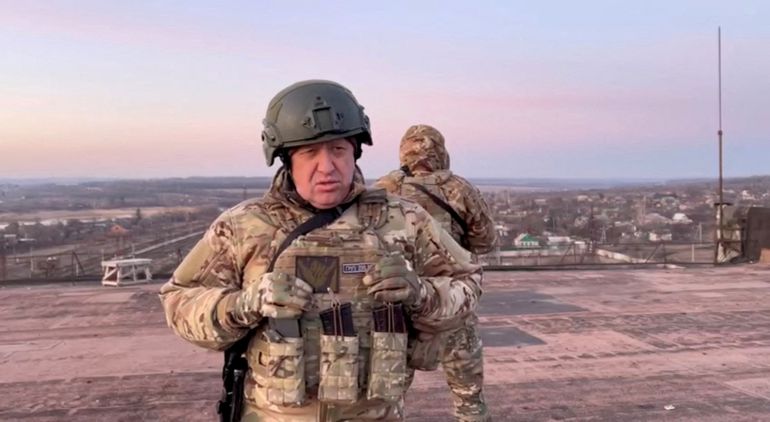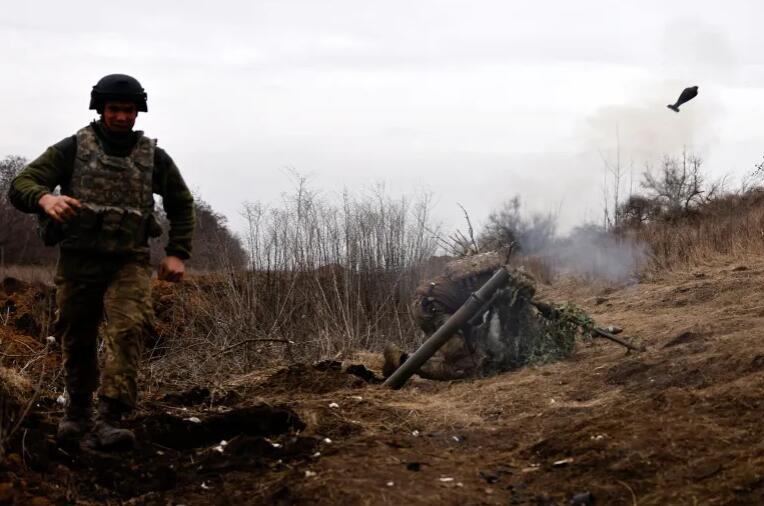As Russian offensive power seemed to peter out across Ukraine’s eastern front, mercenary forces from Russia’s Wagner Group doubled down on attacks against the Ukrainian defenders of Bakhmut city in the Donetsk region during the 55th week of the war.
Ukrainian Colonel Oleksiy Dmytrashkivskyi said Russian ground attacks had decreased over the past week across the front from a high of up to 100 per day to below 30 per day, while there were between two and nine attacks at night. Dmytrashkivskyi believed Russian forces had suffered significant manpower and equipment losses.
The Institute for the Study of War (ISW), a Washington, DC-based think tank, believed Russia’s offensive in the Luhansk region, which neighbours Donetsk, was petering out.
“The Russian offensive operation in Luhansk Oblast is likely nearing culmination, if it has not already culminated, although Russia has committed most elements of at least three divisions to the Svatove-Kreminna line,” the ISW said.
“Russian forces have made only minimal tactical gains along the entire Luhansk Oblast front line over the last week, and Ukrainian forces have likely recently managed to conduct counterattacks and regain territory in Luhansk Oblast,” the institute added.
The United Kingdom’s defence ministry in its latest intelligence update reported that fighting had also slowed round Vuhledar in the Donetsk region, and the only recent success had been seen in the battle for Bakhmut.
“Over the last week, Russian attempts to assault the Donetsk oblast town of Vuhledar have almost certainly slowed. This follows repeated, extremely costly failed attacks over the previous three months… Russia’s only recent tactical success has been in the Bakhmut sector,” the ministry said.
The ISW also believed Russian forces were not pursuing active or successful offensive operations elsewhere in the theatre of war. It said that “as the pace of operations slows along critical sectors of the front, Ukrainian forces likely have an increased opportunity to regain the initiative”.
But in Bakhmut, the city in the Donetsk region where Russia and Ukraine have invested enormous resources, fighting was intensifying.
On March 10, Russian forces were moving into areas of eastern Bakhmut vacated by Ukrainian soldiers when they retreated west of the Bakhmutka River on March 8.
Geolocated footage available on social media appeared to show Russian forces herding Ukrainian civilians at gunpoint at a location west of the river.
“Their further fate is unknown,” wrote a Ukrainian military blogger. “The best things they have are backpacks. From 3 to 10 people walk in columns, behind them a [Russian] with a machine gun.”
Ukrainian Eastern Forces spokesman Colonel Serhiy Cherevaty said on March 11 that fighting in Bakhmut had intensified in the past week and that there were 23 combat clashes in the city over the past day alone. The following day, Cherevaty said more than 39 combat clashes took place within Bakhmut. The General Staff of Ukraine’s Armed Forces also reported that Ukrainian troops had repelled Russian attacks on Bakhmut.
Wagner Group mercenaries, who have led Russia’s fight in Bakhmut for months, tried in February to encircle the city – first from the south then from the north – in an attempt to choke off supplies to the Ukrainian defenders. But they have so far failed to do so.
Within Bakhmut, however, Ukrainian forces appeared to be in a prolonged tactical retreat.
Russian military bloggers claimed that Wagner Group forces had crossed the Bakhmutka River and engaged Ukrainian defenders. Geolocated footage posted on March 13 indicated that Russian forces had advanced along Sadova Street in southern Bakhmut.
Another Russian target seemed to be the city’s AZOM metal processing plant’s industrial zone. Footage posted on social media on March 10 appeared to show Ukrainian forces destroying Russian ammunition close to the zone.
By March 14, Russian military reporters widely claimed that Wagner Group fighters had captured the “Vostokmash” plant in the northern part of the AZOM complex. Images on social media reportedly showed Wagner troops inside the plant.
If Russian forces plan to converge on AZOM, Bakhmut could be in for the sort of endgame suffered by other Ukrainian cities in the east. In the bitterly fought battles of Mariupol and Severdonetsk, Ukrainian forces made their last stands inside industrial complexes whose sturdy construction made them more defensible. They were ultimately, however, either forced to withdraw or surrender due to the strength of Russian firepower.
Wagner versus Russia’s defence ministry
Amid these incremental military successes, Wagner Group founder Yevgeny Prigozhin got into a new public dispute with Russia’s military establishment over the defence ministry’s apparent reluctance to provide his forces with ammunition. The spat was triggered by a comment made by Kremlin-affiliated political scientist Alexei Mukhin, who insinuated Prigozhin had presidential aspirations in Russia and therefore was a potential threat to President Vladimir Putin in the 2024 election.
Prigozhin replied that while Russia’s defence ministry ignored “550 attempts” to procure ammunition for Wagner, Russian troops had transported 12 to 15 cars full of ammunition from the Zaporizhia, Donetsk city, and Avdiivka front lines for use by Wagner fighters in Bakhmut.
The incident suggests that while a public relations war continues between Prigozhin and the Russian defence ministry, which appears to be trying to undermine Wagner, Prigozhin has managed to insinuate himself into the good graces of Russian commanders in Ukraine.
The Wagner boss said as much in answer to a military blogger’s question.

“At the beginning of last year, fate shook [conventional forces] a lot and with their eyes extinguished from pain and betrayal, they stuck to us [Wagner]. We treated and protected them for almost a year: At first, we kept them among ourselves, until, step-by-step, they got stronger. Now they cover one of our flanks,” Prigozhin said.
He then went on to openly undermine Russia’s defence ministry, describing a Russian brigade commander he was on friendly terms with as “a normal, strong Russian man” and saying that “such people should manage the Russian army”.
“We just missed the moment when unprofessional scoundrels and intriguers crushed these modest guys and began to push them around and humiliate them,” he added.
The confrontation between Prigozhin and the defence ministry could well be undermining the Russian offensive.
The ISW also said, “the Wagner offensive itself will not be sufficient to seize Bakhmut”.
Though the think tank noted that Russia could still bring to bear forces that seemed underused in the region, such as Russia’s 2nd Motorised Rifle Division.

